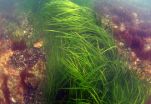Crop pests outwit climate change predictions en route to new destinations
Scientists highlight the dangers of relying on climate-based projections of crop pest distribution
2015-08-04
(Press-News.org) A paper from the University of Exeter has highlighted the dangers of relying on climate-based projections of future crop pest distributions and suggests that rapid evolution can confound model results.
Crop pests and pathogens are destructive organisms which pose a huge threat to food security and land management across the world. Much research has been carried out into why the pests are spreading, where they are likely to establish next, what damage they will do and what can be done to reduce their impact.
In a new synthesis, published today in the Annual Review of Phytopathology, Dr Dan Bebber from the University of Exeter examines the gaps in knowledge which mean that models based only on climate, designed to predict where crop pests and pathogens are likely to end up, can be misleading.
Dr Bebber uses the example of the Colorado potato beetle, an important pest of potato crops whose spread across much of the Northern Hemisphere has been linked to global warming. Although the beetle had invaded most European and Central Asian countries by 1950, one leading climate change computer model predicted it would be unable to establish in Kazakhstan and western China. In fact, the pest spread rapidly through the region - entering Xinjiang Province in China from Kazakhstan around 1992.
This difficulty in projecting future distributions was partly down to the Colorado potato beetle proving to be highly adaptable, evolving its behaviour to burrow down and escape the cold.
Dr Bebber said: "Our review has highlighted how difficult it is to predict where damaging crop pests may turn up. Their ability to evolve tolerance to different climates has been investigated in only a few species but has not been considered in distribution models. We now urgently need to improve monitoring and identification of these pests, particularly in the developing world, both for research and to secure food production."
Dr Victor Izzo from the University of Vermont, who recently published on the adaptation of the Colorado potato beetle, said: "The evolutionary dynamics of insect populations following expansion is an important and often overlooked factor in determining the success of pest invasions. For the Colorado potato beetle, this could not be more evident. The beetle has evolved various ecophysiological traits, including burrowing behaviour and plant-mediated diapause, for surviving within temperate climates, facilitating its emergence as a truly cosmopolitan pest. From an evolutionary standpoint, the subtropical origins of the beetle provide little insight into its current global distribution."
INFORMATION:
'Range-Expanding Pests and Pathogens in a Warming World' by Daniel Bebber is published in the Annual Review of Phytopathology.
For further information:
University of Exeter Press Office
+44 (0)1392 722062 or 722405
pressoffice@exeter.ac.uk
About the University of Exeter
The University of Exeter is a Russell Group university that combines world-class research with very high levels of student satisfaction. Exeter has over 19,000 students and is ranked 7th in The Times and The Sunday Times Good University Guide league table, 10th in The Complete University Guide and 9th in the Guardian University Guide 2015. In the 2014 Research Excellence Framework (REF), the University ranked 16th nationally, with 98% of its research rated as being of international quality. Exeter was The Sunday Times University of the Year 2012-13.
The University has invested strategically to deliver more than £350 million worth of new facilities across its campuses in the last few years; including landmark new student services centres - the Forum in Exeter and The Exchange on the Penryn Campus in Cornwall, together with world-class new facilities for Biosciences, the Business School and the Environment and Sustainability Institute. There are plans for further investment between now and 2016.
http://www.exeter.ac.uk
ELSE PRESS RELEASES FROM THIS DATE:
2015-08-04
Diagnosis of deadly brain conditions could be helped by new research that shows how infectious proteins that cause the disease spread.
The study reveals how the proteins - called prions - spread from the gut to the brain after a person or animal has eaten contaminated meat.
Scientists say their findings could aid the earlier diagnosis of prion diseases - which include variant Creutzfeldt-Jakob disease (vCJD) in people and bovine spongiform encephalopathy (BSE) in cows.
In people, the disease remains very rare - 229 people have died from vCJD since it was first identified ...
2015-08-04
The Society of Thoracic Surgeons, the Society of Cardiovascular Anesthesiologists, and the American Society of ExtraCorporeal Technology have released a set of clinical practice guidelines to address management of a patient's temperature during open heart surgery. The guidelines appear in the August issue of The Annals of Thoracic Surgery and were published simultaneously in two other journals.
Numerous strategies are currently used to optimally manage the practice of cooling the blood, temperature maintenance (control of body temperature during surgery), and rewarming ...
2015-08-04
This news release is available in French. While it is already possible to obtain in vitro pluripotent cells (ie, cells capable of generating all tissues of an embryo) from any cell type, researchers from Maria-Elena Torres-Padilla's team have pushed the limits of science even further. They managed to obtain totipotent cells with the same characteristics as those of the earliest embryonic stages and with even more interesting properties. Obtained in collaboration with Juanma Vaquerizas from the Max Planck Institute for Molecular Biomedicine (Münster, Germany), these ...
2015-08-04
Women who exercised during their teen years were less likely to die from cancer and all other causes during middle-age and later in life, according to a new study by investigators at Vanderbilt University Medical Center and the Shanghai Cancer Institute in China.
The study was published online July 31 in Cancer Epidemiology, Biomarkers & Prevention, a journal of the American Association of Cancer Research.
Lead author Sarah Nechuta, Ph.D., MPH, assistant professor of Medicine in the Vanderbilt Epidemiology Center, said understanding the long-term impact of modifiable ...
2015-08-04
GAINESVILLE, Fla. -- UF Health researchers have found that care linked to heart attacks and chronic obstructive pulmonary disease, or COPD, among disabled adults covered by Medicaid has improved with the expansion of a new health care program in Texas over the last decade.
This approach to health care delivery is growing in popularity across the country, with the number of states implementing similar programs increasing from eight in 2004 to 18 in 2014. These programs have two components: managed care and home- and community-based health services. Managed care is reputed ...
2015-08-04
Toxic is bad. Or is it? New studies of seagrasses reveal that they are surprisingly good at detoxifying themselves when growing in toxic seabed. But if seagrasses are stressed by their environment, they lose the ability and die. All over the world seagrasses are increasingly stressed and one factor contributing to this can be lack of detoxification.
Seagrass meadows grow along most of the world's coasts where they provide important habitats for a wide variety of life forms. However in many places seagrass meadows have been lost or seriously diminished and in several places, ...
2015-08-04
Increasing the number of female speakers at a scientific conference can be done relatively quickly by calling attention to gender disparities common to such meetings and getting more women involved in the conference planning process, suggests a Johns Hopkins Bloomberg School of Public Health researcher.
Reporting online Aug. 4 in the journal mBio, Arturo Casadevall, MD, PhD, professor and chair of the W. Harry Feinstone Department of Molecular Microbiology and Immunology at the Bloomberg School, lays out how the American Society of Microbiology General Meeting was able ...
2015-08-04
COLUMBUS, Ohio - New mothers take a close look at their personal relationship with their husband or partner when deciding how much they want him involved in parenting, new research finds.
The study found that mothers limited the father's involvement in child-rearing when they perceived their couple relationship to be less stable. Mothers also limited fathers who were less confident in their own ability to raise children.
The bottom line is that new mothers are assessing their partners' suitability to be a parent, said Sarah Schoppe-Sullivan, co-author of the study and ...
2015-08-04
When it comes to courting, one common spider species is quick to learn, and that learning process involves eavesdropping on the visual cues of rivals to win their mate. The latest discovery in a research partnership represented by Alma College, The Ohio State University at Newark and the University of Cincinnati is the featured article in the August issue of the international research journal Animal Behaviour.
Previous studies by the researchers explored how brush-legged wolf spiders (Schizocosa ocreata) used visual eavesdropping to try to outdo a male rival's leg-tapping ...
2015-08-04
Cholera is a diarrhoeal disease that is caused by an intestinal bacterium, Vibrio cholerae. Recently an outbreak of cholera in Haiti brought public attention to this deadly disease. In this work, the goal of our differential equation model is to find an effective optimal vaccination strategy to minimize the disease related mortality and to reduce the associated costs. The effect of seasonality in pathogen transmission on vaccination strategies was investigated under several types of disease scenarios, including an endemic case and a new outbreak case. This model is an extension ...
LAST 30 PRESS RELEASES:
[Press-News.org] Crop pests outwit climate change predictions en route to new destinations
Scientists highlight the dangers of relying on climate-based projections of crop pest distribution


